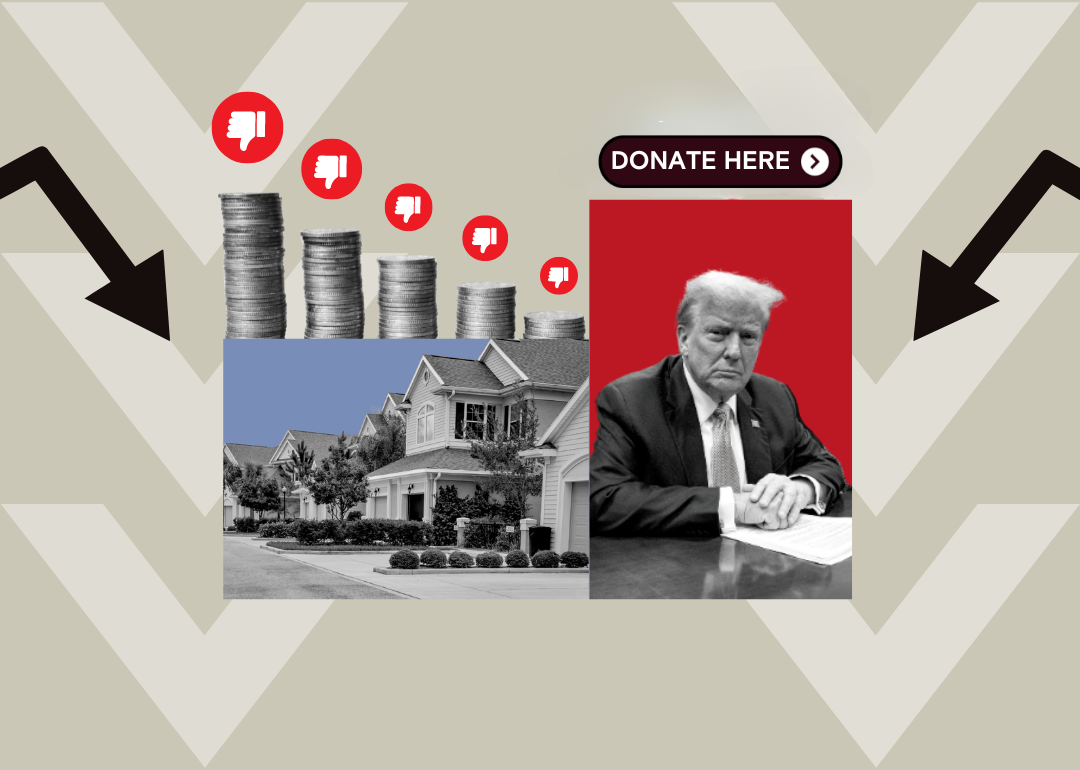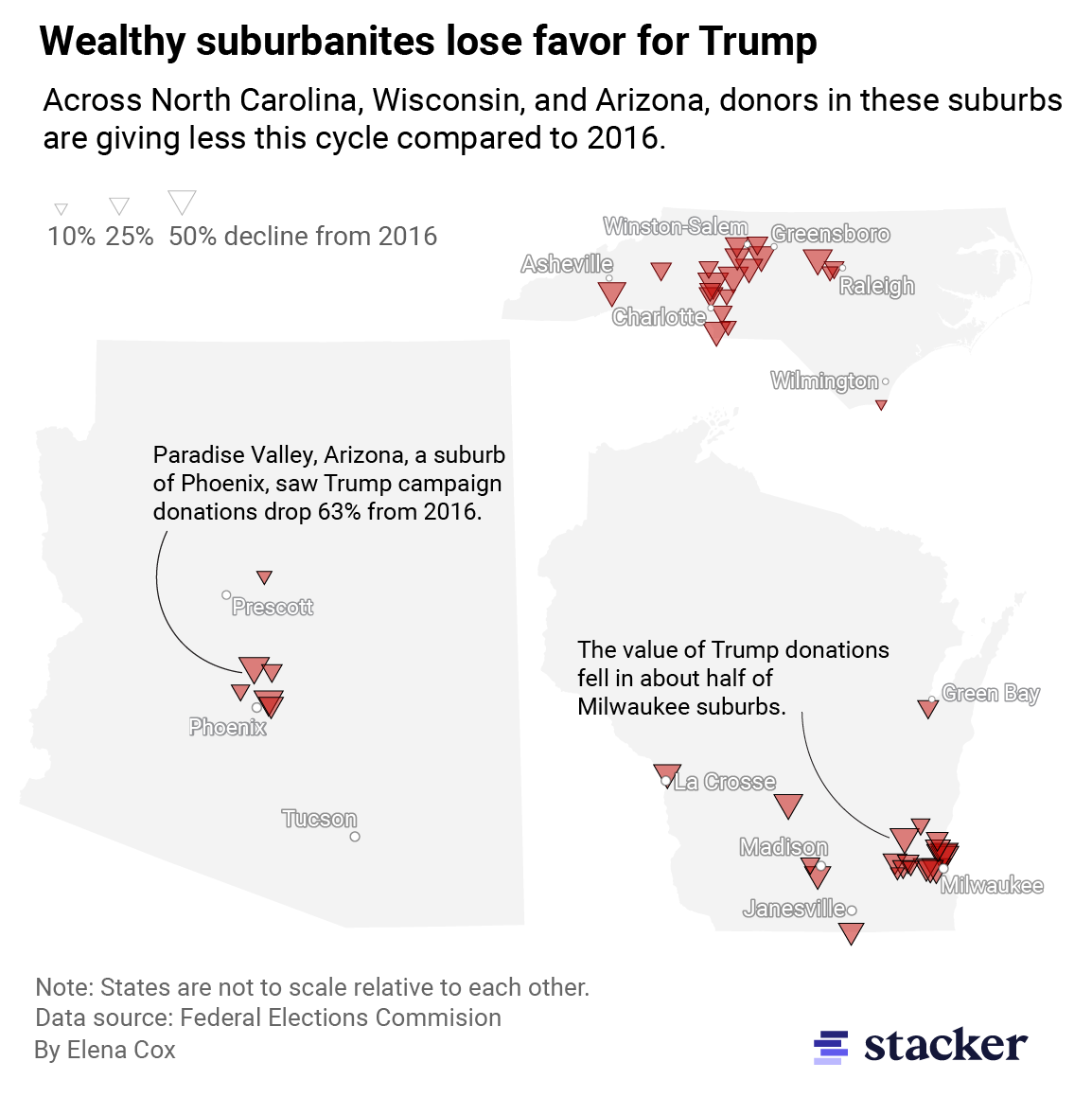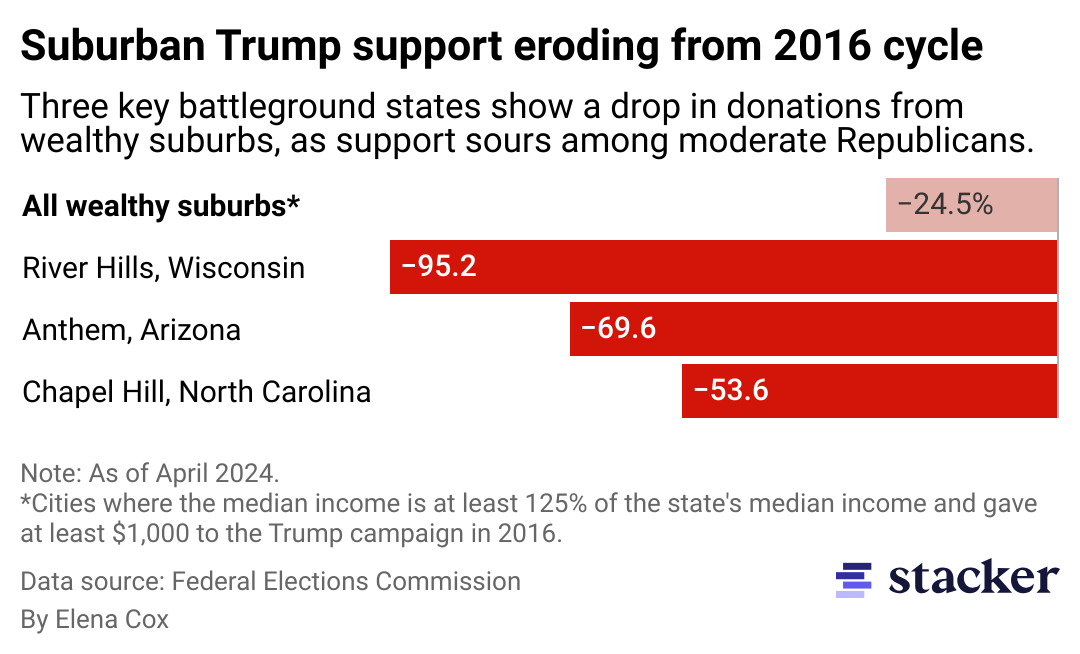The suburban problem that could cost Trump the election

Photo Illustration by Stacker // Getty // Canva
The suburban problem that could cost Trump the election
Photo illustration of diminishing campaign contributions for former President Donald Trump.
Michael Tucker has moved on from Donald Trump. The 44-year-old marketing consultant and longtime Republican who lives in a suburb of Charlotte, North Carolina, voted for Trump twice and donated money to his 2016 and 2020 campaigns.
But Tucker supported Nikki Haley in the state’s Republican primary in March and is planning to vote for President Joe Biden in November. He certainly won’t be cutting Trump any more checks. A campaign contribution to Trump now would likely wind up going toward his mounting legal bills, Tucker told Newsweek, and that “just reeks of corruption.”
“I can’t go back,” Tucker said of voting for the former president or contributing to his third presidential run. “He kind of lost me.”
Trump’s fundraising in wealthy suburbs across North Carolina and other key battleground states is down 25% so far this election cycle compared to 2016, according to an analysis of campaign finance data conducted by Newsweek and the data-driven newswire Stacker.
The sharp decline, which has not been previously reported, indicates that many moderate, college-educated suburban voters like Tucker, who once formed a core part of the Republican Party, are not planning to back Trump in the fall. They’re a critical voting group that helped swing the 2020 election to Biden — and they are widely expected to play a pivotal role again in 2024.
An examination of Federal Election Commission data for North Carolina, Wisconsin and Arizona revealed a significant drop in contributions to Trump from 2016 to 2024 in suburban areas in all three states — from the wealthy Phoenix suburb of Paradise Valley, where donations to Trump are down 63%, to Davidson, North Carolina, a sought-after suburb of Charlotte where Trump’s fundraising is down 47% from the total he raised there in 2016.
The states were chosen for the analysis because they are all important swing states and part of the battleground map that Trump would need to win if he is to return to the White House.
“This data serves as evidence that these college-educated suburban voters who took a chance on Trump in 2016 haven’t returned to him with their vote and their checkbook” in 2024, Brian Seitchik, an Arizona-based Republican consultant, told Newsweek.
You may also like: The latest 2024 state ballot measures — 16 new measures certified in March
![]()

Elena Cox // Stacker
Contributions speak to one part of a complex story
Chart depicting where campaign contributions have dropped off the most for Trump in wealthy suburbs in North Carolina, Wisconsin, and Arizona.
Campaign contributions alone don’t capture the full extent of a presidential candidate’s political support, and other Republicans argued that Trump’s drop in fundraising with suburban voters doesn’t indicate that he’ll lose their support at the ballot box.
A spokesperson for the Trump campaign did not respond to a Newsweek request for comment.
Trump could still see an uptick in donations in suburbs in the final months before the election. The former president raised less money than Biden in the first months of 2024, but his fundraising has increased recently, driven by supporters outraged over his conviction in a New York hush money trial. Trump has said the charges were politically motivated. His sentencing date is July 11.
Anger on the right over the conviction helped the Trump campaign and Republican National Committee raise $141 million in May. The Biden campaign and Democratic National Committee raised a combined $85 million last month, the second straight month that Trump raised more money than Biden.
Still, Democratic and Republican strategists and others told Newsweek that Trump’s challenge to raise as much money in suburban America, in particular, was a sign his legal problems and conservative positions on issues such as abortion were taking a toll.
Suburbs used to be “more Republican donor-centric,” said Scott Falmlen, a senior adviser to the Biden campaign in North Carolina. But now, “there’s a segment of Trump donors who are not giving to Trump anymore.”
‘Disaffection with Trump clear’
Fundraising in North Carolina illustrates Trump’s challenge with the relatively moderate suburban voters he’ll need to carry battleground states in November.
Trump’s fundraising totals are down from his 2016 totals across the greater Charlotte Metropolitan Area, which includes suburban communities such as Davidson, a popular college town a 30-minute drive north of the state’s largest city.
In nearby Mooresville, the Trump campaign has raised just $42,114, down 60% from the $105,120 it raised there during the 2016 election. Trump’s fundraising is also down 49% in Waxhaw and 25% in Cornelius, among other Charlotte-area suburbs — as well as in the suburbs outside of other major North Carolina cities, including the capital Raleigh, Durham, and Asheville.
Trump has seen an uptick in donations from small, sparsely populated rural communities across the state, as well as in some suburbs like Tucker’s hometown of Gastonia. But that hasn’t been enough to offset the drop off in fundraising in bigger suburbs with growing numbers of moderate voters.
“People are moving here at such a rapid rate that it’s shifting [the politics]. They tend to be that moderate voter set,” said Renee Garner, a member of the board of commissioners of Matthews, a suburb of Charlotte that’s turned from red to purple in the Trump years.
Tucker, who is now registered as an independent, has organized a grassroots effort to convince moderate Republicans who are alienated from Trump to vote for Biden in November.
“There’s a lot of us who I think are politically homeless,” he said.
Trump’s shrinking donations in the state’s suburbs, combined with a similar drop in large cities—the campaign’s fundraising totals are down by 41% in Raleigh and 27% in Charlotte—has helped even the fundraising playing field in a traditional Republican stronghold.
Overall, the Trump and Biden campaigns both received $2.42 million in individual contributions in North Carolina this election cycle through the first quarter, with Biden narrowly beating Trump by about $1,000.
Stacker’s analysis for Newsweek counted all the individual donations made directly to the Biden and Trump campaigns in North Carolina, Wisconsin, and Arizona, as well as any contributions made in those states to political action committees and other outside groups who then transferred the funds to the campaigns.
It compared the total contributions the Trump campaign has received so far this election cycle, including during the primaries, with the contributions his campaign received during the primary and general elections in 2016. Suburban areas were identified using the federal government’s data on population size and median household income.
Biden benefited from the fact that, unlike Trump, he did not have to run a competitive primary race this year. But the side-by-side comparison of 2016 and 2024 makes clear how some suburban voters in North Carolina—and other battleground states—have closed their wallets for Trump this time around as he makes his third run at the White House.
The dead-even money race in North Carolina is especially revealing given its history as a solid red state where Republicans could count on a wide turnout and fundraising advantage in rural and exurban areas, where they were more competitive with Democrats in the suburbs.
In 1980, Ronald Reagan beat Jimmy Carter in Charlotte’s Mecklenburg County by one point. In 2020, Biden beat Trump there by 35 points. Reagan beat Carter by less than one point in Wake County; four decades later, Biden carried Raleigh and its suburbs by 26 percentage points over Trump.
Barack Obama is the only Democrat to win North Carolina since 1976. But since Obama’s 2008 win, the subsequent three elections have all been decided by fewer than four percentage points, forcing Republicans to compete in North Carolina to avoid an upset win. Biden almost delivered a surprise win there in 2020, losing to Trump by just 1.3 points.

Elena Cox // Stacker
Is the drop in Trump’s fundraising a red herring or a reliable sign of what’s to come?
Bar chart conveying the drop in Trump donations in River Hill, Wisconsin, Anthem, Arizona, and Chapel Hill, North Carolina.
Trump has held a small but steady lead over Biden in most polls in North Carolina for months. Trump led Biden 48 to 43% among registered voters in a recent East Carolina University poll. The survey was conducted from May 31 to June 3, in the days after Trump became the first former U.S. president to be convicted of felony crimes in the case in New York.
Some Republicans argued that Trump’s drop in fundraising didn’t signify a lack of enthusiasm among suburban voters for the former president or a sign that abortion and other issues have pushed them farther away from the GOP.
“The idea that suburban voters are voting more Democratic, based on social issues, that’s overblown,” Jonathan Felts, a veteran North Carolina Republican consultant, told Newsweek.
“These voters are voting very much on economic issues and in a presidential year, security issues, whether that’s law and order, border security or America’s place in the world,” said Felts, who served as White House political director under former President George W. Bush.
But several Biden campaign officials said the state is winnable. They pointed to the president and Vice President Kamala Harris’ frequent trips to North Carolina as evidence the campaign is serious about competing there in November.
“Across battleground states, suburban, independent, and moderate voters do not want to donate to or vote for Donald Trump, a failed President and a convicted felon,” James Singer, a Biden campaign spokesperson, told Newsweek. “This November, these key suburban voters will re-elect Joe Biden, a president focused on what matters to them: lowering prices, economic opportunity, and safer communities,” Singer said.
The Biden campaign and state Democrats are focused on driving up suburban turnout in other battleground states such as Wisconsin, and fundraising totals there show they could capitalize on a lack of enthusiasm for Trump among moderate voters.
The Trump campaign’s fundraising has dropped sharply in suburbs outside of all of Wisconsin’s major cities.
Contributions to the Trump campaign in Brookfield, a suburb west of Milwaukee, are down 67% so far this cycle compared to 2016. Trump’s fundraising totals are down 24% in Waukesha, another Milwaukee suburb, 42% in De Pere, a suburb of Green Bay, and 33% in Middleton, a suburb of Madison, among others.
Overall, Biden outraised Trump $1 million to $963,000 this election cycle, according to the latest quarterly federal campaign finance data.
Support for Biden in suburban counties around Milwaukee and Madison—longtime Republican areas where demographics have started to favor Democrats—helped him beat Trump in 2020 by 20,000 votes in Wisconsin.
“The quintessential suburbs in Wisconsin are the ‘WOW’ counties, Waukesha, Ozaukee and Washington, and since 2012, those three suburban counties together have shifted 40,000 net votes away from Republicans for president,” said Charles Franklin, the director of the Marquette Law School Poll.
The new residents reshaping the suburbs outside Milwaukee tend to be “higher income, and a higher percentage of them are college graduates and postgraduates,” Franklin added. The new fundraising data shows that “the disaffection with Donald Trump in suburban Republican circles is clear.”
Mixed signs in Arizona suburbs
Arizona is the battleground state where Trump may stand the best chance to turn the tide in the suburbs — though even there, fundraising totals show his support from 2016 has wavered.
In 2020, Biden joined Bill Clinton as the only Democratic presidential candidate to win Arizona since 1948. But Biden’s victory came by just 10,457 votes—or 0.3% of the ballots cast—and voter frustration in Arizona over immigration, the economy, and crime has made it a prime target for the Trump campaign.
Overall, Trump received $2.7 million in contributions in Arizona, far outpacing the Biden campaign’s $1.6 million haul through the first quarter of 2024. The Trump campaign has had more success with suburban donors in the state than most other battlegrounds, especially in the Phoenix area.
Compared to 2016, donations to Trump are up 15% so far this election in Chandler, 28% in Peoria, and 86% in Gilbert—all fast-growing suburbs near Phoenix that have attracted increasing numbers of new residents from California and other states in recent years.
Contributions to Trump have also gone up in some cities, like Tucson, as well as in rural parts of the state that remain deeply conservative.
Still, the Stacker and Newsweek analysis of FEC data shows that Trump’s fundraising has declined in other Phoenix suburbs, such as Paradise Valley and Sun City, the Oro Valley suburb of Tucson, and other suburban areas around Scottsdale and Flagstaff.
The dropoff mirrors demographic shifts in the state that increasingly favor Democrats, said Samara Klar, a political scientist at the University of Arizona.
The debate over abortion in Arizona highlights the recent political shifts in the state that could hurt Trump in the fall, Klar told Newsweek. The Republican-controlled Arizona state legislature voted to keep a 15-week ban on abortion in place earlier this year in response to an outcry over a state supreme court decision to revive an 1864 law with a near-total abortion ban. But the 15-week ban could be challenged by a ballot initiative this fall that would enshrine abortion access in the state constitution.
Trump’s support for abortion restrictions may be a liability in a state where polls show a majority of adults oppose placing broad limits on abortion services. His position on abortion could further alienate suburban moderates in particular, said Klar.
“Having abortion on the ballot is going to be really helpful for Biden,” Klar said, especially in the booming suburbs of Phoenix, where voters are closing their checkbooks to Trump.
“The Phoenix suburbs are growing like crazy,” Klar said. “That’s where Republicans are losing ground, and that’s the area of Arizona they need to be worried about.”
That worry now extends to raising money in Arizona and other battleground state suburbs, said Franklin, the director of the Marquette Law School Poll.
“Democrats are not as invisible in suburban counties now as they were” in the past, Franklin said. Under Trump, the GOP has transformed into a “new populist party that’s looking more to appeal to blue-collar, non-college voters. That’s quite a contrast to the country club Republicans of the old days.”
Additional reporting by Elena Cox, senior data reporter at Stacker; additional data analysis by Emma Rubin, data editor at Stacker.
